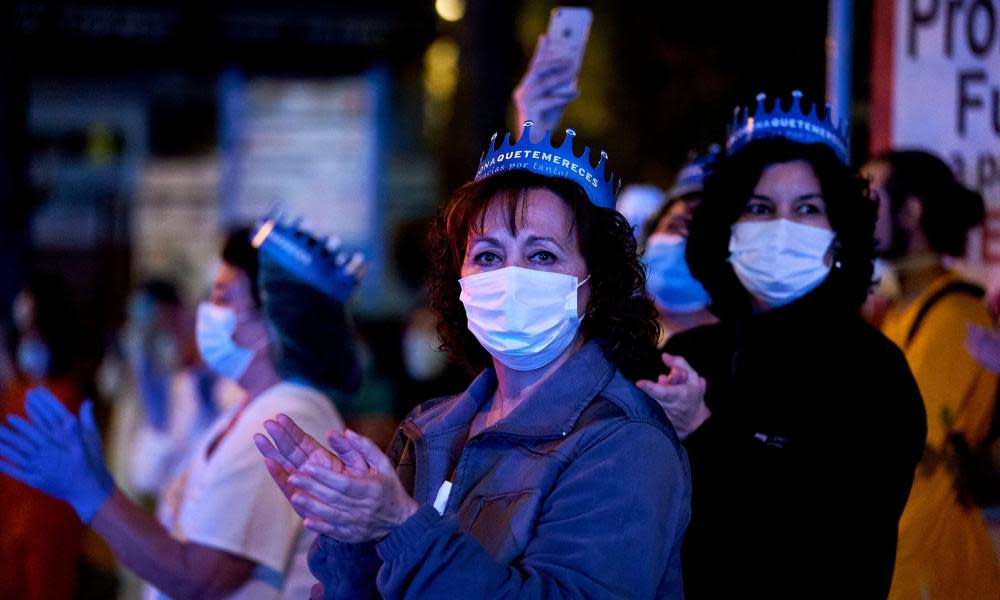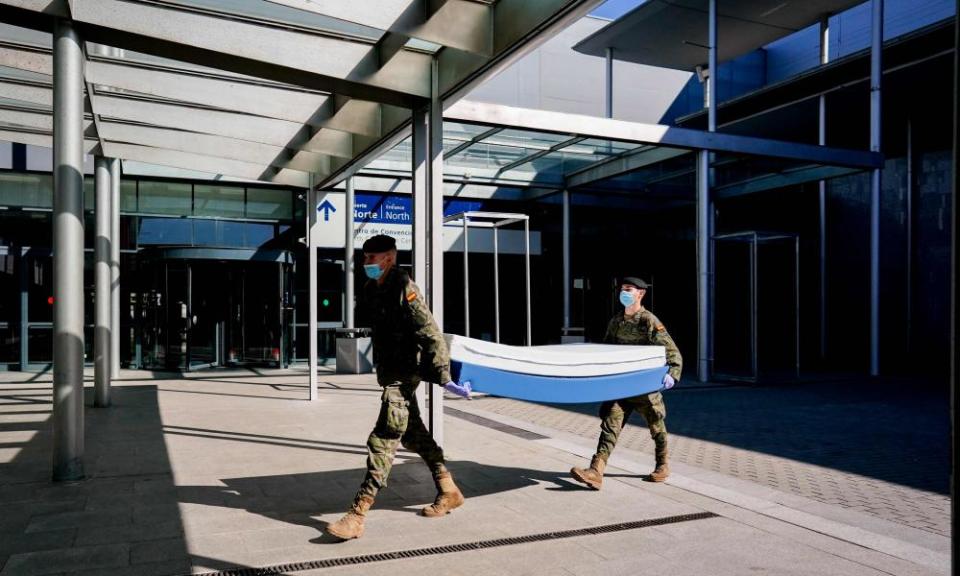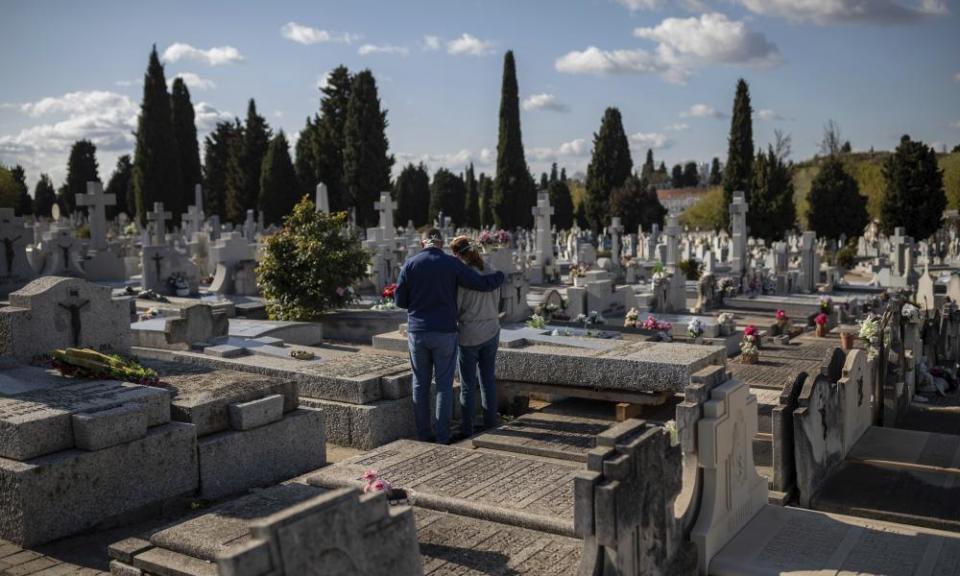'We are naked against the virus': tales of despair from Spain's hospital frontline

With its lush indoor gardens, ornate pavilions and red carpet area, Madrid’s Ifema convention centre was the impressive backdrop Spain showed the world last December, when the country took on last-minute hosting duties for the Cop25 climate summit.
Last week the spotlight was on it once again, but for a far grimmer reason. As Spain becomes an increasingly worrying hotspot of the global pandemic, the Ifema centre has been turned, with help from the military, into one of the country’s largest hospitals. Inside are thousands of beds, in row after precisely spaced row.
Spain’s Covid-19 death toll last week surpassed that of China, and is now second only to Italy’s. Yesterday the number of deaths surged to a new record for the country, with 832 people dying in 24 hours. The virus has so far claimed 5,690 lives.
The figures last night prompted the prime minister, Pedro Sánchez, to tighten its lockdown and order all non-essential workers to stay at home for the next two weeks. In a televised address he said “extraordinarily tough” measures were needed as the county intensified its efforts to contain the pandemic.
One who died was Yolanda Cumia’s father, Juan. Her last conversation with him was on 16 March, after the 87-year-old said he had hurt his foot after a fall at the care home where he lived. Hours later, at 2am, her phone rang again: it was a staff member telling her that her father had died.
Days earlier, two people linked to the home had tested positive for Covid-19, and the invisible killer stampeded through the centre. “She told me: ‘Yolanda, we’re overwhelmed. From what I know, we have 15 people dead.’” The care home did not reply to a request for comment.

Cumia joined others in going public with the news as deaths at the 130-room home climbed to at least 17. Others chimed in with stories from across the country, painting a hazy picture of a contagion that had steadily preyed on the country’s elderly, with ill-equipped staff the only line of defence.
The Spanish government turned to the military for help in disinfecting the residences. What they discovered horrified the country. “The army has seen some totally abandoned elderly people – even some who were dead in their beds,” the country’s defence minister, Margarita Robles, told broadcaster Telecinco.
The revelation was a blow to a country that has long prided itself on good treatment of its elders. “This is the generation that lived through a horrendous civil war and post-war era,” said Cumia. “And now they’re dying alone.”
As the country enters its third week of near-total lockdown, the number of confirmed cases has rocketed to 72,248. The actual figure is likely to be much higher, as people with mild symptoms have been told to self-isolate rather than seek testing.
In some cities the surge in cases has left the country’s healthcare system – ranked among the top 20 in the world – on the edge of collapse, its defences already weakened by austerity measures that shaved billions from its budget.
“Mine is supposed to be a 265-bed hospital, and today it has 700 patients,” said doctor Ana Giménez of Madrid’s Infanta Leonor hospital. “Hundreds of people are sitting in chairs or lying on the floor… all of the hospitals in Madrid are absolutely overwhelmed.”
The situation is exacerbated by a lack of protective gear. “We don’t have anything. We don’t have masks, we don’t have gloves, we don’t have waterproof gowns. We have nothing,” she said. “We are naked against the coronavirus.”
While Spaniards take nightly to their windows and balconies to applaud the efforts of healthcare workers, the government still promises that supplies are on the way. In the meantime, DIY solutions have proliferated, with healthcare workers sharing photos of rubbish bags fashioned into protective gowns.

It is little wonder, said Giménez, that healthcare workers in Spain account for 9,444 of the country’s infected. Those killed by the virus include a nurse and two doctors. Many wonder if they are unwittingly acting as vectors for the virus. “I’m not sure if I’m infecting my family, if I’m infecting my colleagues,” said Giménez, who suffered flu symptoms some 10 days ago.
She has yet to access a test, but her superiors – scrambling to meet the needs of a groaning system – have ordered people with mild symptoms to keep working, she said. “This is not only an epidemic of illness, it’s an epidemic of really bad government.”
The Spanish government had come under fire for being slow to react, allowing political rallies, football games and concerts even as neighbouring France banned large public gatherings.
A delay in rolling out the lockdown allowed Madrileños to leave the city en masse, spreading the virus to coasts and rural areas, while others packed into supermarkets to lay in supplies.
The consequences of these decisions have fallen on healthcare workers, forcing them into some of the toughest choices of their careers, said Giménez, recounting stories of doctors weighing patients’ probability of survival in allocating ventilators. “Most of us, every day we finish our shift and come back home crying.”
Earlier this month Giménez’s union, Amyts, which represents doctors in Madrid, began offering free therapy to healthcare workers. “Every single day,” said Giménez, “one of my colleagues says, ‘my mother died yesterday; my brother died yesterday’.”

In Igualada, near Barcelona, officials are frantically battling one of the world’s deadliest outbreaks, their struggle compounded by steady reports of friends and family affected in the tight-knit community.
In one area, the daily death rate has hovered around 63.1 per 100,000 inhabitants – outstripping Madrid’s 27.9 and that of northern Italy’s Lombardy, Catalan authorities said.
The area went into lockdown days before the rest of Spain, with police stopping residents from leaving home except for essential work. “There is not any other territory that is locked down the way we are,” said Mayor Marc Castells.
A cluster of cases in the local hospital forced staff into quarantine and strained the already-stretched system. Of the area’s 508 cases, 140 are healthcare workers. With help from charity Doctors without Borders, officials are working to transform a sports centre into a 100-bed field hospital.
It’s a situation Castells never thought he or his city would find themselves in as he watched the virus begin its deadly rampage in Asia late last year. “It’s a lot to handle, but we can’t give in,” he said. “As I like to say, we’re not in a well. We’re in a tunnel. We may not be able to see the exit right now, but there will be a light at the end.”

 Yahoo News
Yahoo News 
